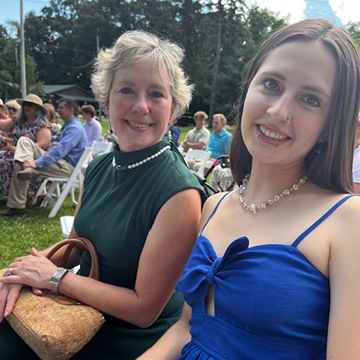‘Research Saved My Life’
Participant benefits range from altruistic to life-changing discoveries
It was the type of typical fall morning destined to be forgotten.
And then the phone rang.
“I remember the surprise at realizing what I was hearing,” says Toddie Hays, 57. “The geneticist on the other end of the call did a wonderful job of conveying information in a thorough and caring way, telling me that I was positive for the BRCA2 gene mutation, and informing me of the implications.”
Women with a BRCA2 gene variant have a significantly higher likelihood of developing certain types of cancer, with some studies estimating a lifetime risk of up to 70 percent for breast cancer and 13 to 29 percent for ovarian cancer. The probability of breast cancer among the general population is about 13 percent. Ovarian cancer is rarer, but harder to detect at an early stage, affecting about 1 percent of the U.S. population.
For Hays, the discovery was happenstance. Her family’s medical history had never prompted concern over a potential BRCA mutation. She had only taken part in genetic testing after speaking to a colleague who mentioned a research study looking for participants. For the past five years, Hays has worked as senior research navigator at the Northwestern University Clinical and Translational Sciences (NUCATS) Institute, where she assists an array of research teams and supports recruitment efforts like ResearchMatch.com.

As a liaison between research teams and tools that can help their studies, I thought, what better opportunity to understand the research experience than to be on the participant side of the equation.”
“As a liaison between research teams and tools that can help their studies, I thought, ‘what better opportunity to understand the research experience than to be on the participant side of the equation,’ ” she says. “I felt that if I am going to support research, I should really support research and get involved to help increase knowledge and advance human health.”
Hays is among 25,000 individuals who participated in the Electronic Medical Records and Genomics (eMERGE) study, a research network of 10 academic medical centers — including Northwestern — that aims to find better ways to assess and manage patients' risk for future health conditions.
“It’s expensive to treat chronic disease,” says eMERGE principal investigator Rex Chisholm, PhD, vice dean for Scientific Affairs and Graduate Education and the Adam and Richard T. Lind Professor of Medical Genetics. “While gene sequencing is also expensive, it should be demonstrated that sequencing is cheaper than treating a chronic health condition. A cost-benefit analysis could show that intervening earlier results in healthier people.”
Laura Rasmussen-Torvik, PhD, co-director of the NUCATS Center for Education and Career Development, and NUCATS member Elizabeth McNally, MD, PhD, Elizabeth J. Ward Professor of Genetic Medicine, are also principal investigators on the national study.
Since its discovery 30 years ago, individuals with known BRCA mutations are presented with enhanced treatment options, although it’s estimated that only 1 in 10 women living with the BRCA2 mutation are aware of it. For Hays, the knowledge provided an opportunity to act.
At the end of July, Hays had successful surgery to remove her ovaries and fallopian tubes. As a high-risk individual, the procedure was recommended to prevent ovarian cancer. Removal of ovaries and fallopian tubes reduces the risk of ovarian cancer by 90 to 96 percent. Hays is also increasing breast cancer screening, alternating mammograms with ultrasound and MRI with contrast.
Because the BRCA2 gene mutation is hereditary, Hays decided to share the results and explain the inherent risk to her daughter, and immediate family members.
“As a mother, we always want to protect our children — but there is no way to deter or modify our inherited genetics, and so being informed is essential,” she says. “We are having our 21-year-old daughter tested for a broad panel of markers, and we will be well informed on the best options moving forward.”
As part of the support team for ResearchMatch at Northwestern University Feinberg School of Medicine, Hays says the participant experience is one she plans to repeat. ResearchMatch is a no cost program supported by the NIH to help connect people interested in research participation with applicable matches to research studies and teams at a local, regional, or national level.
“It is incredibly easy to participate,” says Hays. Individuals who sign up on ResearchMatch and complete a profile then state their areas of interest, and can select, or opt out of, different topics or types of research. Once a profile is complete, the algorithm will seek matches to selections, and participants receive an email suggesting research opportunities.
“Assuredly, I am now an even bigger proponent of participating in medical research,” says Hays. “I have encouraged my family, friends, and all research contacts to be engaged in research studies. Knowledge is power and engaging in research can save lives, even your own — or your family’s.”
Written by Roger Anderson




